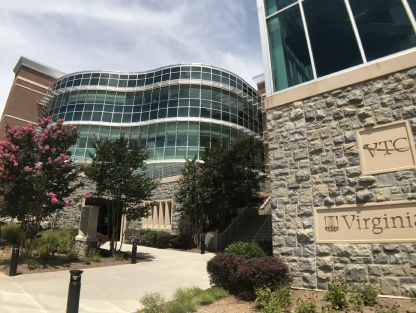Geriatric Medicine Fellowship

Welcome!
Thank you for your interest in the Carilion Clinic Virginia Tech Carilion Geriatric Medicine Fellowship!




About Our Program
- Mission, Goals, and Strengths
Mission
The Carilion Clinic–Virginia Tech Carilion Geriatric Medicine Fellowship trains compassionate, forward-thinking physicians to lead in the care of older adults. Through immersive, interdisciplinary experiences across hospitals, clinics, homes, and community settings, fellows gain the skills to provide exceptional care and advocate for aging populations. Our program blends clinical excellence with meaningful community engagement—preparing fellows to make a lasting impact in geriatric medicine.
Honoring Carilion Clinic’s mission—“Improving the health of the communities we serve”—as well as our values:
- Collaboration – Working together with purpose to achieve shared goals.
- Courage – Doing what's right for our patients.
- Commitment – Unwavering in our quest for exceptional quality and service.
- Compassion – Being empathetic and humanistic in our care.
- Curiosity – Fostering creativity and innovation in our pursuit of excellence.
Program Aims
1. Develop Competent, Board-Certified Geriatricians
Equip fellows with the clinical expertise, professionalism, and medical knowledge required to become board-certified, independent geriatricians capable of delivering high-quality, person-centered care in both academic and private practice settings.2. Foster Interprofessional Collaboration
Promote excellence in communication and teamwork by modeling and practicing interprofessional collaboration across diverse healthcare environments, preparing fellows to lead within interdisciplinary teams.3. Engage with the Community Through Clinical Service and Education
Advance community health by providing compassionate care and outreach in a variety of clinical settings. Fellows will also participate in educational initiatives that empower older adults, caregivers, and community partners.4. Support Individualized Scholarship and Quality Improvement
Encourage fellows to pursue meaningful quality improvement and scholarly projects that reflect their personal interests and career goals, fostering a commitment to lifelong learning, innovation, and evidence-based practice.5. Promote Leadership in Geriatric Care
Develop fellows’ leadership skills to prepare them for roles in clinical program development, healthcare policy, advocacy, and education—ensuring they can influence and improve systems of care for older adults.6. Address Health Equity and Social Determinants of Aging
Equip fellows to recognize and address disparities in healthcare access, outcomes, and quality among older adults, with a focus on cultural humility, health literacy, and the social determinants of health.7. Advance Skills in Transitions of Care and Complex Care Management
Train fellows to manage complex, multi-complex conditions and navigate transitions of care across settings, including hospitals, skilled nursing facilities, outpatient clinics, and home-based care.8. Integrate Geriatric Principles Across Specialties
Encourage fellows to serve as consultants and educators who integrate geriatric principles into other medical specialties, promoting age-friendly care throughout the healthcare system.- Department Specs
Specialties
- Geriatric Medicine
Program Size
- 2 fellows per year
Population Served
- The aging population of southwest Virginia
Teaching Opportunities
- Educational opportunities for Internal Medicine residents, Family Medicine residents, and Virginia Tech Carilion School of Medicine (VTCSOM) Medical Students
Volunteer Opportunities
- Alzheimer’s Association
- Local Agency on Aging
- Various Local Nonprofits
Locations
- Carilion Roanoke Memorial Hospital
- Salem Veteran Affairs Medical Center
- Program of All-Inclusive Care for the Elderly (Innovage)
- Regional Long-Term Care Facilities
Board Pass Rate
- 100%
Academic Affiliation
- Virginia Tech Carilion School of Medicine
- Diversity, Equity, and Inclusion
We actively pursue efforts to promote diversity, equity, and inclusion (DEI) in order to address existing and long-standing inequities in our healthcare system, which have disproportionately impacted minoritized groups in the communities we serve. We believe that high-quality patient care cannot be delivered until we have a diverse and representative physician workforce. As such, we support enhancing inclusive excellence in order to best care for our patients and to enrich the lives of those in our community.
- Virginia Tech Land Acknowledgement
Virginia Tech acknowledges that we live and work on the Tutelo / Monacan People’s homeland, and we recognize their continued relationships with their lands and waterways. We further acknowledge that the Morrill Land-Grant College Act (1862) enabled the commonwealth of Virginia to finance and found Virginia Tech through the forced removal of Native Nations from their lands in western territories. We understand that honoring Native Peoples without explicit material commitments falls short of our institutional responsibilities. Through sustained, transparent, and meaningful engagement with the Tutelo / Monacan Peoples, and other Native Nations, we commit to changing the trajectory of Virginia Tech's history by increasing Indigenous student, staff, and faculty recruitment and retention, diversifying course offerings, and meeting the growing needs of all Virginia tribes and supporting their sovereignty.
See more here

Virginia Tech Partnership
Residents and fellows work closely with the students, medical educators, and research scientists from the Virginia Tech Carilion School of Medicine and Fralin Biomedical Research Institute at VTC. This partnership leverages Virginia Tech’s world-class strength in basic sciences, bioinformatics and engineering with Carilion Clinic’s highly experienced medical staff and rich history in graduate medical education.


 Back to Top
Back to Top